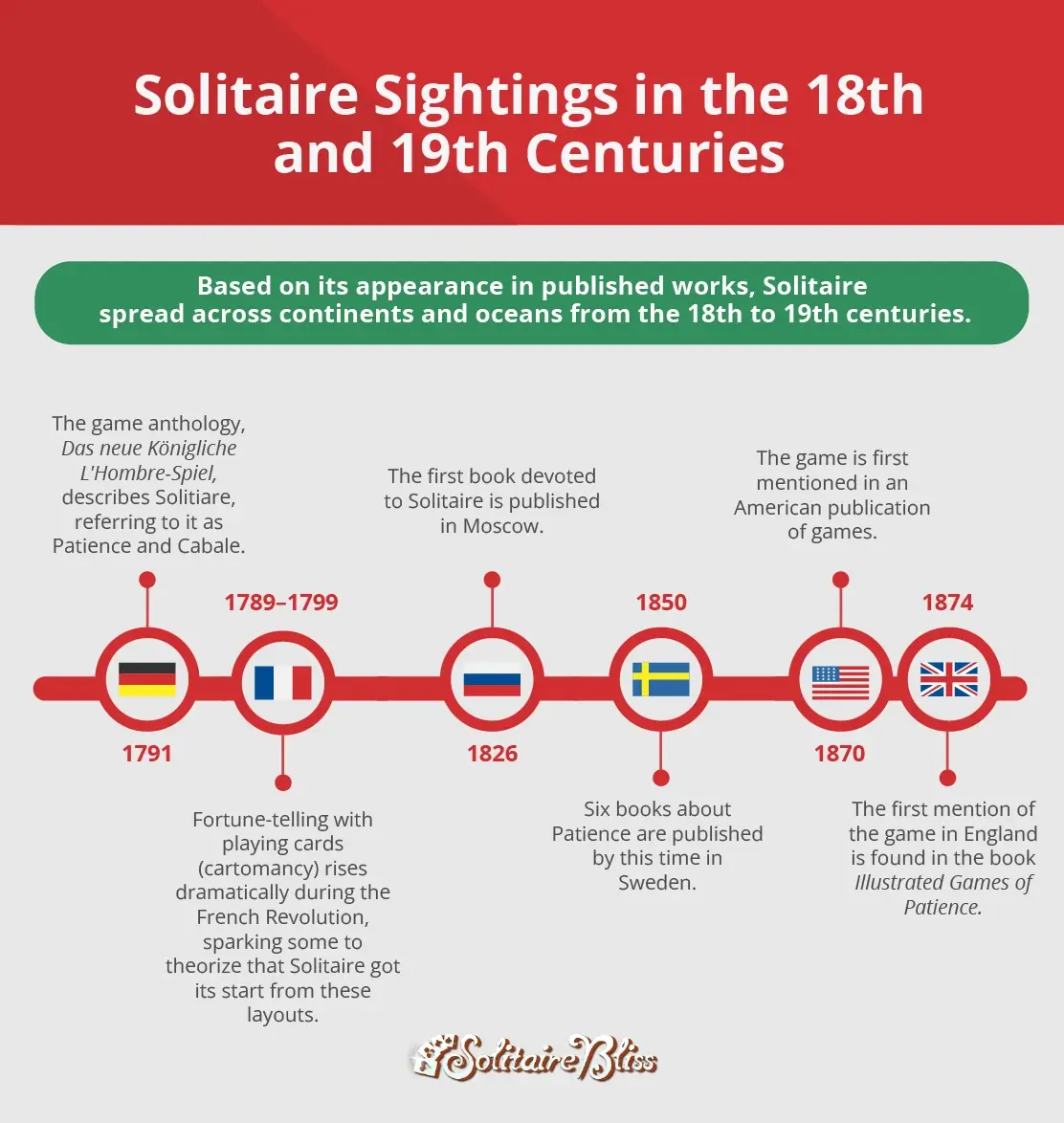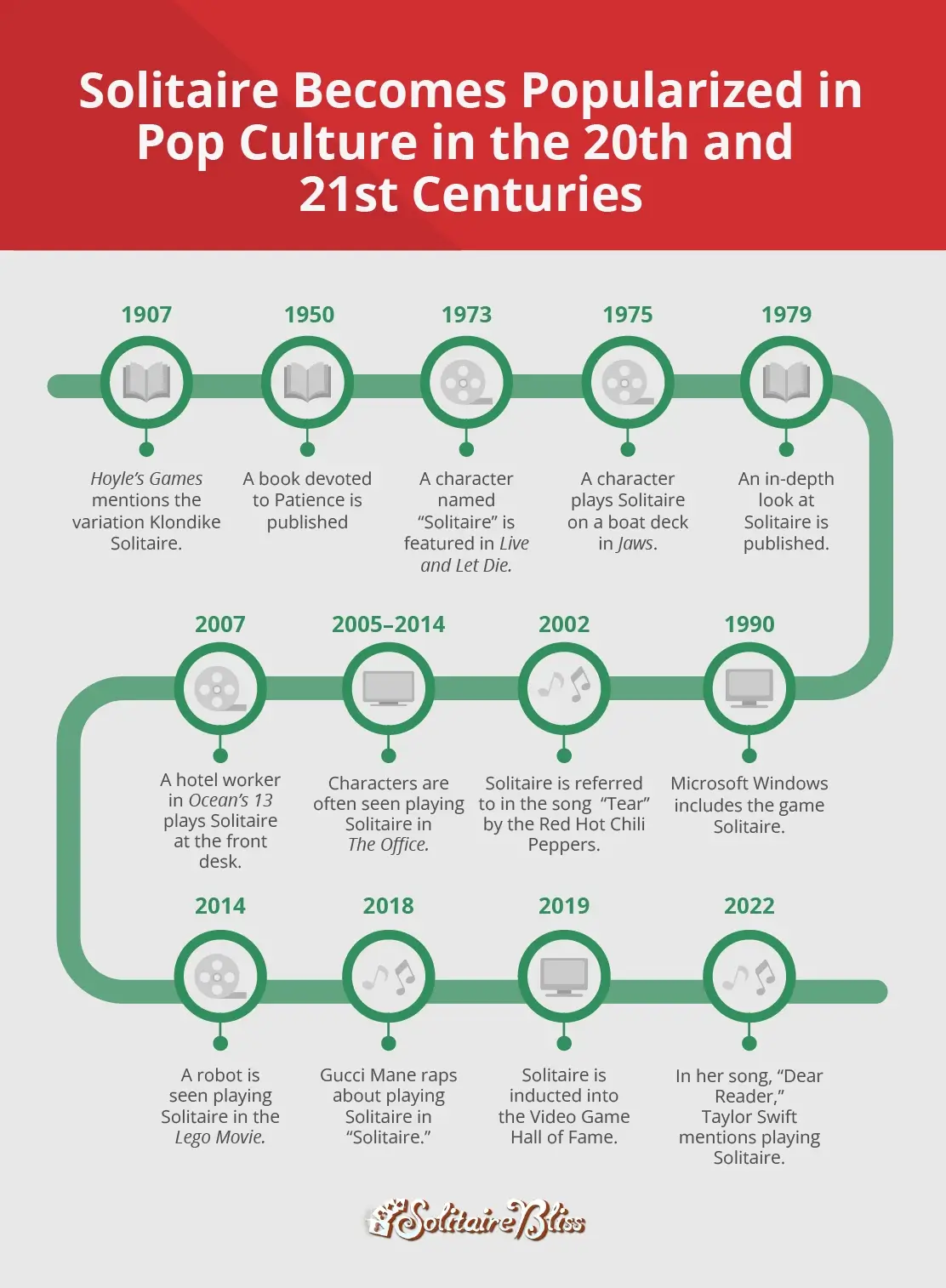When Was Solitaire Invented: Origins, Evolutions, and Variations
Solitaire is one of the most popular single-player card games that dates back for centuries. While its origins aren’t precisely known, most agree its roots are European, specifically German or Scandinavian with possible ties to fortune-telling.
The game goes by many names, including Patience, Klondike, Cabale, and even Réussite in French, revealing how it has spread and evolved from cultured 18th-century society roots to a widespread online game with hundreds of engaging variations. Because the game frequently showed up in publications and popular culture in the past few centuries, you can see how Solitaire evolved and impacted society throughout the ages.
Descending from its exclusive, high-society roots to instant availability on any handheld device around the world today, the game of Solitaire offers players of all skill levels a variety of ways to test their skill, strategy, and determination.
18th Century: Solitaire History Begins in Mystic Aristocracy
The origin or inventor of Solitaire remains unknown, but descriptions of the game were known to have surfaced in texts in the late 18th century in Europe, with mainly the upper, aristocratic class playing the game and many theorizing that the game itself was connected to fortune-telling.
Solitaire was a familiar enough game by the 18th century to be included in publications that either described whole groups of different games or focused solely on discussing various card games. Solitaire card games were not only included in these volumes, but some texts even described a different version of the game or included varying tableau layouts.
A German text, Das neue Königliche L'Hombre-Spiel, published in 1791, was a game anthology that called the game both Patience and Cabale. The game almanac, Das neue Spielalmanach für, another German publication published in 1798 also describes the game, but it’s described as being played between two players with onlookers betting on the outcome.
Cartomancy (fortune-telling using cards of any kind) rose dramatically during the French revolution of the late 18th century and into the post revolutionary period of France in the early 19th century. So some theorize that Solitaire originated from divination or fortune-telling (cartomancy) because cartomancy layouts, much like tableau layouts in early Solitaire variations, coincide with descriptions of the game in publications.
Regardless of the origin of Solitaire, the game was well known by its French name, Patience, by the end of the 18th century because French was the en vogue language of the educated upper class. In fact, even furniture was made during the Georgian period that was dedicated to the game. Patience tables served a double function as both an element of elegant home decor and a functional piece with a folding top for playing the card game.

19th Century: Solitaire Reaches New Players and Classes
Whether used for leisure, betting, or fortune-telling, Solitaire continued its popularity in the 19th century, reaching new classes of people across a variety of regions. By this time, publications had begun recording rules for the game instead of just descriptions, reaching from Russia and the Baltic region to England and America.
In the early part of the century, the first book devoted solely to the game was published in Moscow (1826), and six were published in Sweden before 1850. The first American mention of the game was a collection published in 1870, and the earliest mention of the game in England was Illustrated Games of Patience by Lady Adelaide Cadogan (published in 1874). This particular text is important because instead of being just an anthology filled with card games to play, this book was devoted entirely to Solitaire.
Many other women wrote books that included the game — many of which were entirely devoted to Patience — in the 19th century, showing that it had not only been popularized with women but was also viewed as a suitable leisure activity for them. Games of Patience for One of More Players by Mary Whitmore (published in 1887), offered variations of the game for single players as well as muli-player versions.
Mrs. E.D. Cheney’s book, Patience (published in 1875) not only calls out the game’s connection to Germany and Sweden but begins by discussing how the game has many variations and is a good diversion for women after doing chores. It even references how to use it as a fortune teller — you determine the outcome of a future event based on whether you win the game. And Amusements for Invalids by Annie B. Henshaw (published in 1870) reinforces how the game is useful to simply pass the time.
With such books solely written on a single card game, Solitaire variations were clearly numerous by that time, using either one or two standard decks of cards and with tableaus exhibiting a wide variety of layouts.
Because of the Industrial Revolution, more people in lower classes had the free time to take up the card game. And even novels written by famous authors in this century reflected that the game was enjoyed not only by aristocracy but the lowest classes as well.
For example, Leo Tolstoy has the old countess playing Patience in his novel War and Peace, published in 1867, while she waits for her husband and son to return. But Charles Dickens has the criminal, Magwitch, playing Patience in Great Expectations, published in 1861.
20th Century: Solitaire Pauses in Play Then Explodes
Although Solitaire had become a common solo game for so many in the 19th century, Solitaire’s big moment—digital expansion in the later part of the century—would make this game a household name.
While Solitaire enjoyed a bit of a golden age in the 19th century, the first part of the 20th century saw little of the game, by any name, mentioned in publications or popular culture. Hoyle’s Games mentions the variant, Klondike Solitaire (likely named in connection to the widely known Klondike gold rush of that time period), in its game rules book in 1907, but between two world wars and the Great Depression, people likely didn’t have the same amount of leisure time some had enjoyed in the earlier century to play the game.
My mid-century, a new anthology devoted to the game of Patience was published in 1950 as well as another, more in-depth, publication in 1979. These books explored different variations and classified them by type or logical play so readers could find several games that played similarly to variations they enjoy playing.
From spaghetti westerns featuring cowboys playing different variants of the game to action films, you start to see Solitaire making its way onto the big screen in the later part of this century, showcasing its broad influence on society.
In the James Bond movie of 1973, Live and Let Die, Jane Seymour’s character is called Solitaire because she supposedly excludes men from her life. Of course, this is based on the literary character in Ian Fleming’s novel by the same name, published in 1954. In 1975, the movie Jaws shows someone playing Solitaire on the deck of a boat, emphasizing how the card game was played in all sorts of places.
No history of Solitaire would be complete without noting how, near the end of the century, Solitaire was poised to explode with its inclusion in the Microsoft Windows 3.0 operating system in 1990. The computer game was developed in 1988 by Wes Cherry, who was an intern at Microsoft at that time.
The purpose for including the game was to help people understand how to use the mouse to interact with the computer’s icons, windows, and menus. However, Microsoft’s version reached users who had never played before, and the game’s popularity and use exploded. Solitaire variations like the easier game of FreeCell and the more challenging Spider Solitaire gained popularity.

21st Century: Solitaire Becomes Iconic
With Solitaire pre-loaded on most personal computers, and the move to mobile platforms so far in the current century, Solitaire is now at everyone’s fingertips regardless of whether you have a deck of playing cards handy.
With 98% of Americans owning a cell phone, Solitaire is ready to play on multiple devices in every household, reaching an even wider audience and a range of spaces than in the late-20th century. People no longer are tied to playing on a computer at home or at work. They can play while waiting in line at the grocery store, sitting at their children’s sporting events, or waiting for your meeting to start.
Although card games, including Patience, could always be spotted in popular culture throughout the centuries, Solitaire’s current go-to popularity is now cementing the game as a cultural icon of the 21st century. Used to convey a variety of emotions as wide-ranging as the number of Solitaire variations you can try, it can reflect boredom and frustration to determination and control.
The song “Tear” by the Red Hot Chili Peppers (2002) mentions the game in its opening verse, “I can see clearly now that this is not the place for playing Solitaire,” referencing that boredom has no place in life and that it should be lived to the fullest.
And in the sitcom, The Office, you can often see the actors playing Solitaire. They had a lot of downtime, and so they paid bills and played Solitaire between takes, cementing the idea that people turn to the classic game when hitting a wall at work or when filling gaps of time. Ocean’s 13 reinforces that idea as it features a hotel worker at the front desk playing Solitaire instead of helping the hotel reviewer with his request for a new room.
In The Lego Movie, in 2014, one of the robots can be seen playing Solitaire when the cop is interrogating Emmett, which reveals that even the younger generations are familiar with the game and how it can be played anywhere, even in jail. Gucci Mane, in fact, named a song after the game in 2018, rapping about how he spent his time in prison “sittin' in a cell playin' Solitaire,” and Taylor Swift mentions the game in her song (2022), “Dear Reader,” telling listeners, “No one sees when you lose when you’re playing Solitaire,” which emphasizes the idea of solitude.
In 2019, Solitaire was inducted into the Video Game Hall of Fame for its global popularity, broad accessibility, and key role in introducing millions to personal computing through Microsoft Windows. With an undeniable connection for centuries, Solitaire offers both a visual and thematic shorthand to the everyday, solidifying the game as an approachable, accessible pastime for all ages. And with AI and AR (augmented reality) platforms constantly evolving, the future history of card games is sure to further cement the iconic classic into emerging technologies.
The Enduring Spirit of Solitaire
Firmly rooted in centuries of play, Solitaire’s legacy isn’t just historical, it’s also deeply personal. Players have used the game throughout history as a way to balance luck and logic as well as a calming game to challenge their mind or fill their time. Whether played for diversion or to reap the many cognitive benefits of Solitaire, the simple game has been offering a challenge to players from the aristocrats of the 18th century to the digital natives today.
From computer analysis to employing Solitaire strategies, people look for ways to both enjoy the game as well as get a best score, and the numerous variations offer players a wide range of difficulty. Even if you think you’re skilled at the classic game, you can challenge yourself to difficult Solitaire games, and as technology advances and play evolves, more variations and challenges are sure to erupt.
Make Your Mark with Solitaire Bliss
Whether you need an easier variation, like FreeCell, or want to challenge yourself with the more difficult Spider Solitaire, you can cement your own place in history with this classic card game and its many variations. Check out Solitaire Bliss to engage in the centuries-old game and keep the spirit of Solitaire alive.
Back to the Homepage

